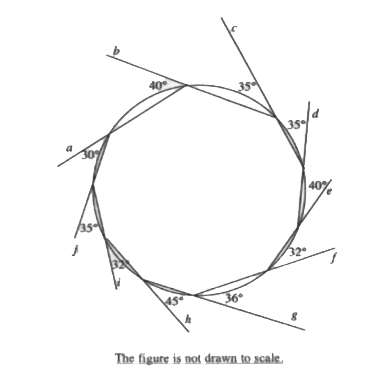If U = {c, d, e, f, g, h, i, j} and A = { c, d, g, j} , find A′
Text Solution
The correct Answer is:A′ ={e, f, h, i}
|
Topper's Solved these Questions
- SET LANGUAGEBOOK - NCERT TAMILCHAPTER - SET LANGUAGEEXERCISE - Exercise 1.1
27 Videos
- SET LANGUAGEBOOK - NCERT TAMILCHAPTER - SET LANGUAGEEXERCISE - Exercise 1.2
34 Videos
- REAL NUMBERSBOOK - NCERT TAMILCHAPTER - REAL NUMBERSEXERCISE - Example
94 Videos
- STATISTICSBOOK - NCERT TAMILCHAPTER - STATISTICSEXERCISE - THINK AND DISCUSS
2 Videos
Similar Questions
Knowledge Check
In the figure, a,b,c,d,e,f,g,h,i, and j are chords of the circle. Which two chords are parallel to each other?
 Aa and fBb and gCc and hDe and f
Aa and fBb and gCc and hDe and fIf F=a.(|b|).c.(|d|).e.(|f|).g(|h|).i.(|j|) and G=a.b.c.d.e.f.g.h.i.j Again, a=(−1)1,b=(2)−2,c=(−3)3,d=(4)−4,…..j=(10)−10 then the correct relation is :
AF=−GBF=GCF.G=1DNone of these
If sinθ=12 then θ=
View SolutionLet A = { b,d,e,f }, B = { c,d,g,h} and C = {e,f,g,h} .Find :
C -A
View SolutionLet A = { b,d,e,f }, B = { c,d,g,h} and C = {e,f,g,h} .Find :
A- B
View SolutionLet A = { b,d,e,f }, B = { c,d,g,h} and C = {e,f,g,h} .Find :
B-C
View SolutionLet A = { b,d,e,f }, B = { c,d,g,h} and C = {e,f,g,h} .Find :
(A−B)∪(B−A)
View SolutionIf U = {a,b,c,d,e,f,g,h} , find the complement of the following sets:
A= {a,b,c} , B ={d,e,f,g} , C ={a,c,eg}, D = {f,g,h,a}.
View Solution
